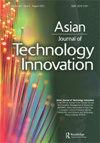Cognitive proximity, technological regime and knowledge accumulation: an agent-based model of interfirm knowledge exchange
IF 1.7
4区 管理学
Q3 BUSINESS
引用次数: 4
Abstract
ABSTRACT Innovations in industrial clusters are highly dependent on a combination of internal and external knowledge among cluster firms with optimal levels of cognitive proximity. Meanwhile, all innovation activities in a cluster are affected by technological regime within that cluster, which is captured in terms of knowledge cumulativeness and knowledge distribution in this paper. Based on knowledge-based theory, this study develops an agent-based model of interfirm knowledge exchange, exploring the interplay of cognitive proximity and technological regime on a cluster’s knowledge accumulation. The results corroborate that cognitive proximity and cumulativeness condition jointly exert a significant inverted ‘U’-shaped effect on a cluster’s knowledge accumulation. The strength and shape of this effect are different for clusters with low versus high levels of cognitive proximity. Furthermore, the study extends the literature on technological regime by distinguishing the effects between knowledge cumulativeness and knowledge distribution, and the results reveal that large firm clusters (/SME clusters) perform best under a high (/low) level of knowledge cumulativeness. By simulating the sequential process of innovation dynamics, the study deepens understanding of mechanism behind how proximity affects innovation within clusters, thereby contributing to disentangling the interrelationships between cognitive proximity and technological regime.认知接近、技术机制与知识积累:基于主体的企业间知识交换模型
产业集群的创新高度依赖于集群企业内部和外部知识的结合,并具有最佳的认知接近水平。同时,集群内的所有创新活动都受到集群内技术制度的影响,这在知识积累和知识分布方面得到了体现。本文在知识基础理论的基础上,建立了基于主体的企业间知识交换模型,探讨了认知接近度和技术制度对集群知识积累的影响。结果表明,认知邻近性和累积性条件共同对集群的知识积累产生显著的倒“U”型影响。这种效应的强度和形状在认知接近度高低的集群中是不同的。此外,通过区分知识积累和知识分布对技术制度的影响,扩展了文献的研究成果,结果表明,大企业集群(/中小企业集群)在高(/低)知识积累水平下表现最佳。通过模拟创新动态的顺序过程,加深了对集群内接近性影响创新机制的理解,从而有助于理清认知接近性与技术制度之间的相互关系。
本文章由计算机程序翻译,如有差异,请以英文原文为准。
求助全文
约1分钟内获得全文
求助全文

 求助内容:
求助内容: 应助结果提醒方式:
应助结果提醒方式:


